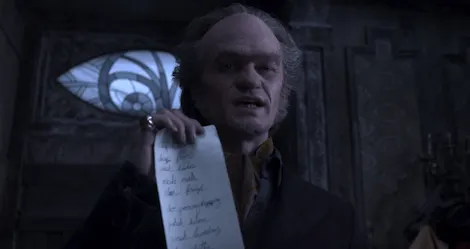
Best Bookish Moments in Netflix’s “A Series of Unfortunate Events”
I’ve been a fan of Lemony Snicket’s A Series of Unfortunate Events since I was a baby child, scouring the school book sale for paperback versions of the newest releases. As you can imagine, I couldn’t wait until Netflix released their adaptation of the series. I was optimistic that it would be better than the film, which I only accepted at one point because when you’ve got nothing, you take what you can get. As someone who re-read the series over this past winter holiday, I firmly believe that Netflix couldn’t have done a better job portraying the heart and soul of these books.
Eight episodes long, this first season covers the first four books in the series: The Bad Beginning, The Reptile Room, The Wide Window, and The Miserable Mill. One of my favorite elements of the books, especially during my re-read as an adult, was how crucial books are throughout the Baudelaire children’s attempts to escape the clutches of the dastardly Count Olaf again, and again, and again. Therefore, I put together a short list of the book-related moments in the Netflix adaptation that either made me think, appreciate, or laugh.
Here are my favorite bookish moments in the television series – not a comprehensive list, just the highlights. Some of these are also present in the book series, but they were gratifying to see on camera nonetheless.
- Mr. Poe’s son named Edgar (I wonder if his middle name is Allan?) arguing with his brother about whether a certain fowl is a crow or a raven. I find this absolutely hilarious and I did not pick up on the significance of the name of this extremely minor character until my most recent re-read.
- Patrick Warburton as the narrator, Lemony Snicket, taking a moment to explain dramatic irony. This was in the books as well, and all through my years of schooling, that chapter was the only reason I understand dramatic irony. I can only hope this part of the series enlightens a new generation of viewers.
- The name-dropping of well-known authors. Authors who are either mentioned, quoted, or whose names are used as curses throughout the series include: Nathaniel Hawthorne, Thornton Wilder, Samuel Beckett, and Haruki Murakami, among others. The Baudelaires are certainly well-read children.
- Books of all sorts being vital to the Baudelaires’ survival. For example – the importance of a manual called Nuptial Law is a primary plot point in the first two episodes, while journals with scientific information about poisonous snakes are vital in the third and fourth episodes. Referencing grammar guides is part of what saves the Baudelaires in the fifth and sixth episodes. And finally, in the seventh and eighth episodes, a history of Paltryville helps shed light on the Baudelaire parents’ past. (That was the only disappointment, really, as a single book about optometry and hypnotism serves a much larger role in the book version of The Miserable Mill). But I was so glad to see that the Baudelaires’ penchant for reading and research was still important throughout the entire series.
- This quote: “All your silly codes and obscure literary references can’t save you!” I want to live in a world where obscure literary references might even have the chance to save me, honestly.
- At one point in the sixth episode, the Baudelaires have to take a taxi to their guardian’s home, and the scene cuts to the taxi driver dropping them off after what was surely a riveting conversation, as the taxi driver is seen saying: “Believe me, I’ve had this conversation a million times. If you look at the white whale in terms of postcolonialism…” (As a bonus, the taxi driver introduces himself shortly afterwards as Ishmael.)
- And finally, the moment that made me laugh harder than I have in a long, long time, this conversation, which takes place outside of a sinister eye-shaped optometry office:













